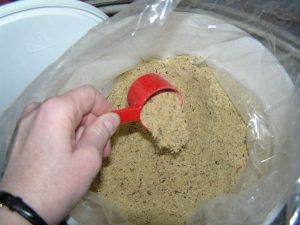
By Dr. Shane Baird
Watch a horse in the pasture when left to his own devices. Horses spend a whole bunch of time on grass consumption and lazing around. On occasion,  something might spook him or he might play for a while with a herd mate. On the whole though, the vast majority of his time is not what might be called “high impact” aerobic exercise.
something might spook him or he might play for a while with a herd mate. On the whole though, the vast majority of his time is not what might be called “high impact” aerobic exercise.
Now, take that same horse and place him in a “show barn,” where he still spends much of his day lounging around and eating, but he’s also put through a rigorous training schedule. This training might include jumping, dressage, or reining patterns, but whatever the discipline, I think we can all say we have never seen a horse in a pasture just run through a reining pattern or jumping of his own accord!
Just as the body of a human athlete can deteriorate over time, so can an equine athlete. Whether it is due to a singular event, like a severe sprain, or just the wear and tear of life, the resulting issues look very similar. The deterioration is called Osteoarthritis (OA). We know that this kind of damage is going to happen, so what can we do to prevent it?
Any equine publication will have multiple advertisements for joint support, but for today’s discussion we will address Legend, Adequan, and Oral joint supplements. Any, and sometimes all, of these might be warranted to reduce the damage caused to the joints just from their normal job. Additionally, if lameness issues are starting to arise, it could slow the progression of OA.
Adequan and Legend Administration
Adequan and Legend are both injectable joint therapies to relieve inflammation associated with osteoarthritis or synovitis. Legend is given through an intravenous injection, once a week for 3 weeks, then given monthly afterwards. Adequan is given in the muscle, once every 4 days for seven treatments. This process is then repeated in about 6 months, but some horses go 8-12 months without needing additional Adequan doses.
Geeking out!
Adequan is a polysulfated glycosaminoglycan (PSGAG). Say what? PSGAG’s are molecules which exert many effects, the most important being the inhibition of the catabolic (destructive) enzymes that attack and damage the joint fluid and cartilage. This process decreases the inflammation and pain associated with arthritis, resulting in a more comfortable horse. Adequan has also been shown to help aid in the production of new cartilage.
Legend is pure Hyaluronic Acid (HA). When placed intravenously, hyaluronic acid stimulates the body to create more HA of its own, acting on the synovial (joint) lining. This natural production helps to decrease the production of prostaglandins. Prostaglandins are known to cause cartilage destruction.
In the end, Adequan and Legend both decrease inflammation within the joint, and there is good research to support these claims. In each animal, one may work better than the other for many reasons, or the best choice might be to utilize the benefits of both! Discussion with a medical professional regarding the specifics of your animal’s issues and workload will help to direct you to the best option.
Oral Supplements
It can seem that there are as many oral supplements as there are stars in the sky. Which one to choose? The shortest and easiest answer is to ask your veterinarian, with reference to your horse and any condition they might suffer from. Your veterinarian can also prescribe an appropriate oral supplement for the level of use your horse is under.
Unlike the Legend and Adequan discussed above, oral joint supplements are considered “nutraceuticals,” whereas the others are considered “FDA approved  drugs.” What does that mean for you as the consumer? Most importantly, it means that the FDA drugs have been closely scrutinized for effectiveness and safety. The nutraceuticals fall under a general umbrella of “food” per the FDA, and the FDA is not authorized to review dietary supplement products for safety and effectiveness before they are marketed. In my mind, this makes the supplement market very much a “buyer beware” kind of market. There are far too many to discuss here individually, so please discuss with a professional before committing a significant amount of your horse dollars to a potentially inefficacious product.
drugs.” What does that mean for you as the consumer? Most importantly, it means that the FDA drugs have been closely scrutinized for effectiveness and safety. The nutraceuticals fall under a general umbrella of “food” per the FDA, and the FDA is not authorized to review dietary supplement products for safety and effectiveness before they are marketed. In my mind, this makes the supplement market very much a “buyer beware” kind of market. There are far too many to discuss here individually, so please discuss with a professional before committing a significant amount of your horse dollars to a potentially inefficacious product.
Although Legend, Adequan or oral joint supplements do not, nor are they likely to, make the claim that they can prevent lameness issues, they are often used for that reason. Instead of waiting for lameness issues to arise, hard working horses are started prophylactically on joint therapies, with the idea of preventing these problems. Treating lameness like we do infectious disease certainly has merit. Rather than sitting back and then playing catchup, might this line of thinking be appropriate for your equine athlete?








No comment yet, add your voice below!